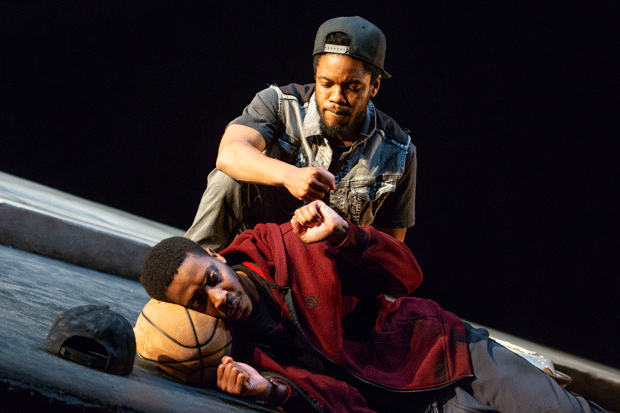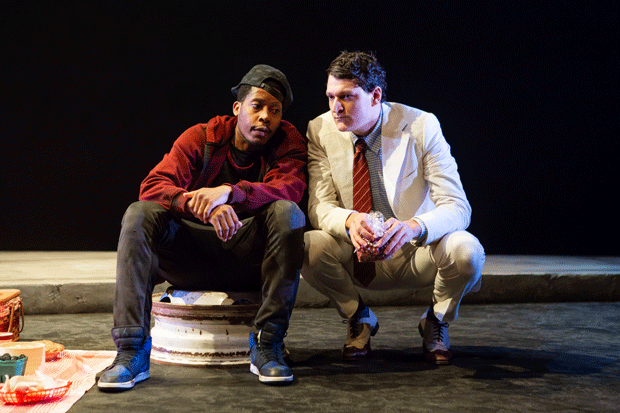Pass Over Examines the Existential Crisis of Black Men in America

(© Jeremy Daniel)
Antoinette Nwandu's Pass Over — a provocative, inflammatory, exquisitely written work — is a new masterpiece of modern drama. It excited controversy when it first appeared at Chicago's Steppenwolf last year and provoked critical reviews that some readers found racist. Spike Lee subsequently saw the play, recognized its power, and filmed a performance of it that is now streaming on Amazon Prime.
Since then, Nwandu has revisited the text, rewritten its ending, broadened its scope, and enriched its symbolic resonance. Now running at Lincoln Center's Claire Tow Theater, Pass Over has benefited from the revisions. This new production, directed again by Danya Taymor, provokes the uncomfortable, challenging conversations we need to have as our country grapples with racial bigotry that persists not just in law enforcement but in the very fabric of American culture.
Nwandu's impetus for Pass Over was the troubling frequency with which black men have lost their lives at the hands of police. She took literary inspiration from Samuel Beckett's play Waiting for Godot, which follows two repetitive days of a pair of vagrants who question the purpose of their existence in a nameless nowhere-land from which they are unable to escape. Pass Over uses a similar framework to look at the lives of two black men, Kitch and Moses (impeccable performances, respectively, by Namir Smallwood and Jon Michael Hill, who reprises his role). They spend their days beneath a lamppost in a desolate urban landscape encircled by sand that at times harks back to earlier settings of slavery, including a 19th-century Southern plantation and the Egyptian desert of the Exodus story (evocative set design by Wilson Chin).
Before the play begins, Taymor lulls us with familiar, cozy standards like "Singin' in the Rain" and "Oh, What a Beautiful Mornin'." As the music plays and Moses sleeps, his head resting on a deflated basketball, Kitch roams across the stage, looking out into the audience for signs of danger (one of the play's subtle foreshadowings of the final scene). The relaxed, nonthreatening atmosphere, however, quickly vanishes. "Yo, kill me now," cries Moses as he starts awake. "Bang bang!" replies Kitch. It's the beginning of another dangerous night for the two men, so to put each other at ease, they engage in wordplay and banter with profanity-laden dialogue. In Pass Over, language is an act of survival.

(© Jeremy Daniel)
Under the glow of the artificial light, the men spend their tension-filled night trying to joke away their fear while avoiding the ever-present threat of confrontation with the "po-po." (Marcus Doshi's lighting and Justin Ellington's sound design punctuate the action now and then with a recurring stage effect that illuminates the men's constant anxiety of being stopped, frisked, and shot.) As they dream of escaping the block for a distant Promised Land, they encounter two men (both menacingly played by Gabriel Ebert): the first, a white man named Mister, whose civilized manner, powder-blue baseball cap (effective costume design by Sarafina Bush), and picnic basket filled with food for the hungry pair belies his true nature; the second, a white cop named Ossifer, whose uninhibited use of violence, both physical and psychological, shackles Moses and Kitch to the block. The following night, Moses awakes as he did the night before, and it seems at first as though this night will be much the same as the last. But events take a tragic turn when Ossifer and Mister appear again.
Pass Over takes direct aim at white power structures embodied by Ossifer and Master. Ebert's racist Ossifer oozes corruption as he breaks the men down. "Who are you?" he coos at Moses, who stands with his arms behind his head. "Stupid," says Moses slowly, "lazy…violent…thug," spoken by Hill with heartbreaking hopelessness. Smallwood, in an equally impressive and refined performance, conveys Kitch's terror as he looks on. Ossifer, however, is not invincible. Moses later discovers his true power and calls down the wrath of God on Ossifer. Though supernatural intervention fits with the play's Exodus motif, the twist has the feel of a deus ex machina.
Nevertheless, Moses and Kitch find a more dangerous foe in Ossifer's civilian counterpart. Ebert plays Mister with a disarming politeness that hides his sinister desire to maintain society's status quo by keeping black men like Moses and Kitch where they are. The play doesn't let white audience members dissociate themselves from Mister or take shelter in racially enlightened liberalism: Failing to stand against injustice is like pulling a trigger.
To relate more here would be to dilute the visceral experience of the play itself. Pass Over urges us to get to the tough business of addressing the racial issues that we're afraid of discussing and then act to end the injustices. Waiting for change, Moses and Kitch remind us, is not an option.










